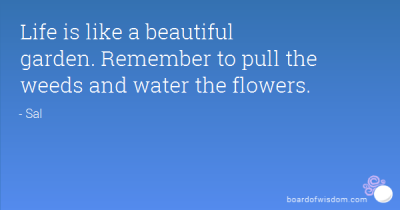 I just can’t help but talk about gardening this time of year. I admit it – I’m addicted. It’s not uncommon for me to get my garden gloves on early on a Saturday morning and still have them on when at sundown. Once I start working in my garden, I just can’t stop – especially this time of year. So why am I going to talk about caregivers resentment and weeds in your garden?
I just can’t help but talk about gardening this time of year. I admit it – I’m addicted. It’s not uncommon for me to get my garden gloves on early on a Saturday morning and still have them on when at sundown. Once I start working in my garden, I just can’t stop – especially this time of year. So why am I going to talk about caregivers resentment and weeds in your garden?
Weeds can take over a garden – very quickly. And before you know it, the weeds are all there is in the bed. It’s unsightly and worse, it keeps the good stuff from popping up. They zap the energy in the earth, grabbing all the good minerals for themselves, and leaving those gorgeous flowers to fend for themselves. So what’s the answer? Pull them! And keep pulling them – don’t stop! Because if you do, they’ll soon find out they are unwanted and with proper bed preparation, the weeds eventually get the signal that there is no room for them.
Caregiver resentment, like weeds, can creep into a caregivers world and take over quickly. Caregiver resentment is not healthy, does not allow the beauty to shine and certainly is not good for your overall health. So let’s have some straight-talk on caregiver resentment. Have you heard this from someone else or be honest – have these words come out of your own mouth?
“I’m just exhausted. Mom has been in rehab for over a month and once again my brother hasn’t made it in, my sister came for a few hours – LIKE ALWAYS- I’m the one holding down the fort. I’m there every waking moment, running home to care for the dogs, water the plants and make sure the mail is taken in. No one seems to EVER get that I have a job and other responsibilities. I guess their upcoming vacation is just taking all their time in planning. Gosh, it must be nice.”
I’m going to stick my neck out here and say this is not only resentment but a serious case of caregiver martyrism. We’ll call this fictitious (but very real) person Mary. Obviously, Mary is very resentful of her siblings not stepping up to the plate. We don’t know if Mary has expressed to them the need for help. It has happened before, so either her siblings have not been told that they need to take on some caregiving responsibilities or maybe Mary has just determined she would take it all on. I would venture to guess that she might even be a little resentful of the dogs, plants, and mail – not to mention her mother!
Mary is experiencing caregiver resentment – toward her siblings, added responsibilities and quite possibly her mother. I’m guessing that her visits with her mom may be stressed-filled and hurried. In addition, her resentment might be affecting her other relationships with loved ones and friends.
If Mary were to offload some chores, and either accept that her siblings are not helping, or seek assistance from other sources, she may find the weeds of resentment begin to shrivel up. Her visits with mom may be more pleasant, and she might even have time to spend with her family, friends, and hobbies. Of course, I would suggest that Mary dig in the dirt and actually do some weed pulling herself! It’s great therapy and teaches you so much about what’s important in life while learning little nuggets of truth along the way.
Caregivers, please watch for those weeds of resentment that may be creeping into your life and before they take over, please do some digging. Resentment is not healthy for you, and it’s not fun to be with someone who is carrying this with them.
Remeber to pull the weeds and water the flowers – it’s a gift to yourself and those around you!
Pam Brandon is President/Founder of AGE-u-cate Training Institute and a passionate advocate for older adults and those who serve them. A longtime family caregiver herself, she has devoted the last 10 years to helping caregivers better care for others and themselves.
http://www.AGEucate.com
